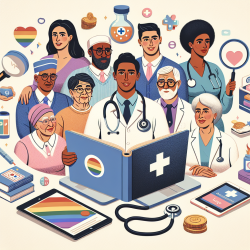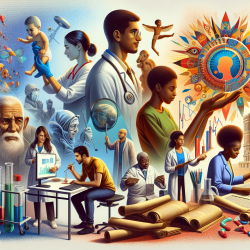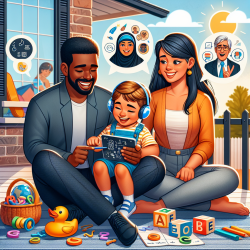Understanding the Unique Needs of Older LGBT Patients
The landscape of healthcare is ever-evolving, and with it, the need for culturally competent care becomes increasingly critical. As practitioners, it is imperative to understand and address the unique healthcare needs of older Lesbian, Gay, Bisexual, and Transgender (LGBT) patients. A recent study, "Addressing the healthcare needs of older Lesbian, Gay, Bisexual, and Transgender patients in medical school curricula: a call to action," highlights the importance of integrating these considerations into medical education.
Why Focus on Older LGBT Patients?
By 2030, the population of older LGBT adults is expected to reach between 2 and 6 million in the United States. These individuals face distinct healthcare challenges, including higher risks of disability, mental health issues, and chronic conditions compared to their non-LGBT peers. Furthermore, societal factors such as living alone and relying on 'chosen families' for support add layers of complexity to their healthcare needs.
Key Findings from the Research
The research emphasizes several critical points:
- Older LGBT adults are more likely to experience healthcare disparities, including inadequate access to preventative screenings and higher risks of chronic diseases.
- Social support networks for older LGBT individuals often differ from those of their heterosexual counterparts, with a greater reliance on non-biological 'chosen families.'
- There is a significant need for medical education curricula to incorporate training that addresses these unique needs, focusing on cultural competence and understanding of LGBT eldercare.
Implementing Change in Medical Education
To bridge the gap in healthcare disparities, the study suggests several strategies for enhancing medical education:
- Integrating LGBT eldercare content into existing curricula, ensuring that future healthcare providers are equipped with the knowledge to offer culturally competent care.
- Utilizing problem-based learning approaches to explore complex end-of-life care decisions and legal challenges faced by older LGBT patients.
- Engaging with local LGBT communities to provide students with real-world insights and experiences, fostering empathy and understanding.
Encouraging Practitioners to Take Action
As practitioners, it is crucial to stay informed and proactive in addressing the needs of older LGBT patients. This involves not only incorporating the findings of such research into practice but also advocating for continued education and reform in medical training programs. By doing so, we can ensure that all patients receive the dignified and respectful care they deserve.
To read the original research paper, please follow this link: Addressing the healthcare needs of older Lesbian, Gay, Bisexual, and Transgender patients in medical school curricula: a call to action.










